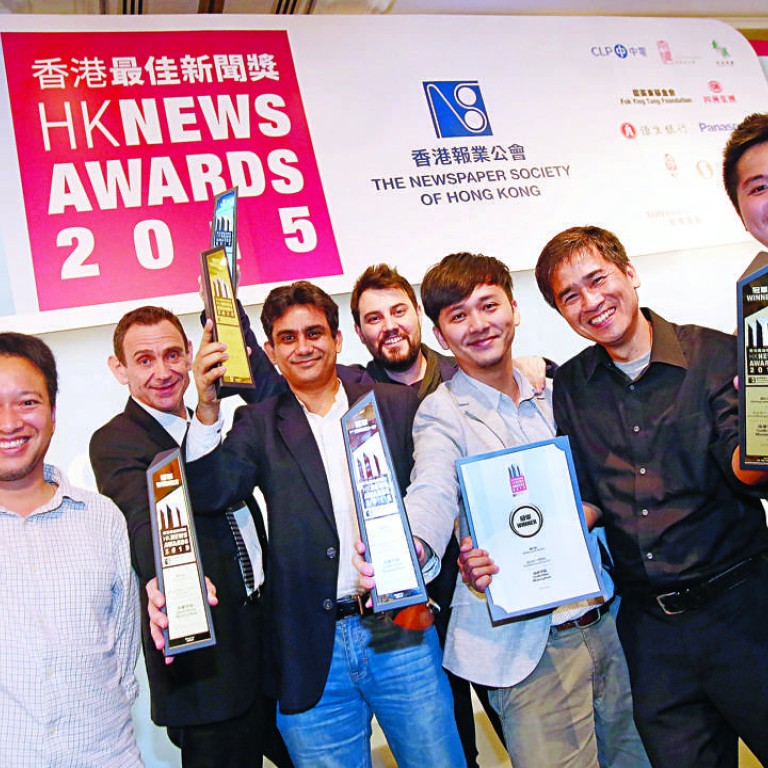
A free press is an indispensable part of Hong Kong, says chief executive
Leung Chun-ying speech coincides with fears over editorial policy at Ming Pao and poll showing public concern at media freedom
Chief Executive Leung Chun-ying has pledged to uphold press freedom, saying it is the government’s “constitutional responsibility” and an indispensable element that makes Hong Kong an international city.
Leung was delivering a speech on Monday at the presentation ceremony of the Newspaper Society of Hong Kong’s annual news awards.
It was the first time he had officiated at the event since becoming chief executive in 2012. Previously, Chief Secretary Carrie Lam Cheng Yuet-ngor was the officiating guest. There were rumours that Leung had avoided showing up because he was unhappy that news stories on the illegal structure at his home won awards in 2012.

Other Post winners were Hong Kong desk reporters Phila Siu and Chris Lau, photographer Dickson Lee, and graphics director Alberto Lucas Lopez.
In his address, Leung said: “We safeguard a free press not only because it is the government’s constitutional responsibility, not only because it is Hong Kong society’s core value.
“It is because it is an indispensable condition for Hong Kong as an international city. It is also an important foundation that can maintain Hong Kong’s competitiveness and maintain the city as a free and open society.”
Hong Kong daily Ming Pao runs blank columns in protest at sacking of top editor
He added: “Upholding press freedom is to uphold Hong Kong’s way of living.”
His address coincided with the brewing row over Ming Pao’s abrupt sacking of its chief executive editor Keung Kwok-yuen at the Chinese-language newspaper last week.
Ming Pao journalists at Monday’s ceremony wore black in protest at Keung’s dismissal, which has sparked concerns about a perceived decline in press freedom in Hong Kong. A poll last week by the University of Hong Kong found people’s satisfaction with press freedom had dropped to its lowest point since the handover.
Ming Pao’s staff union said the move was meant to punish “dissidents of editorial decisions” and accused editor-in-chief Chong Tien-siong, who announced the dismissal on grounds of cutting costs, of attempting to obstruct freedom of expression.
It had demanded the newspaper management apologise and reinstate Keung.
In the Monday issue of Ming Pao, two more columnists – former journalist Li Wai-ling and Vivian Tam Wai-wan of Chinese University – submitted blank columns to express their discontent at the newspaper’s decision. The empty spaces were run in Ming Pao’s print edition but included an editor’s note explaining the move was purely commercial and the newspaper’s editorial policy would remain intact.
Martin Lee SC leaves Ming Pao column empty to oppose editorial change
This followed similar “blank column” protests on Sunday by three other columnists – Audrey Eu Yuet-mee of the Civic Party, Eva Chan Sik-chee, a former Ming Pao reporter, and veteran media personality Sam Ng Chi-sum.
In the Canadian Sunday edition, the blank columns were replaced with cartoons, without an editor’s note.
Keith Kam Woon-ting, chief operating officer of Ming Pao Holdings, said Ming Pao had been “very liberal”.
“We have been very liberal. I don’t think many newspapers elsewhere in the world would allow such a thing to happen – submitting blank columns,” said Kam, who dismissed allegations that the management had intervened with the operations of the editorial unit.
“I have been with Ming Pao for 30 years. I have never touched on the editorial department.”
In 2014, Ming Pao also ran blank columns by writers including Chan and Ng in protest against a decision to replace ex-chief editor Kevin Lau Chun-to with Chong. No editor’s note accompanied these.

